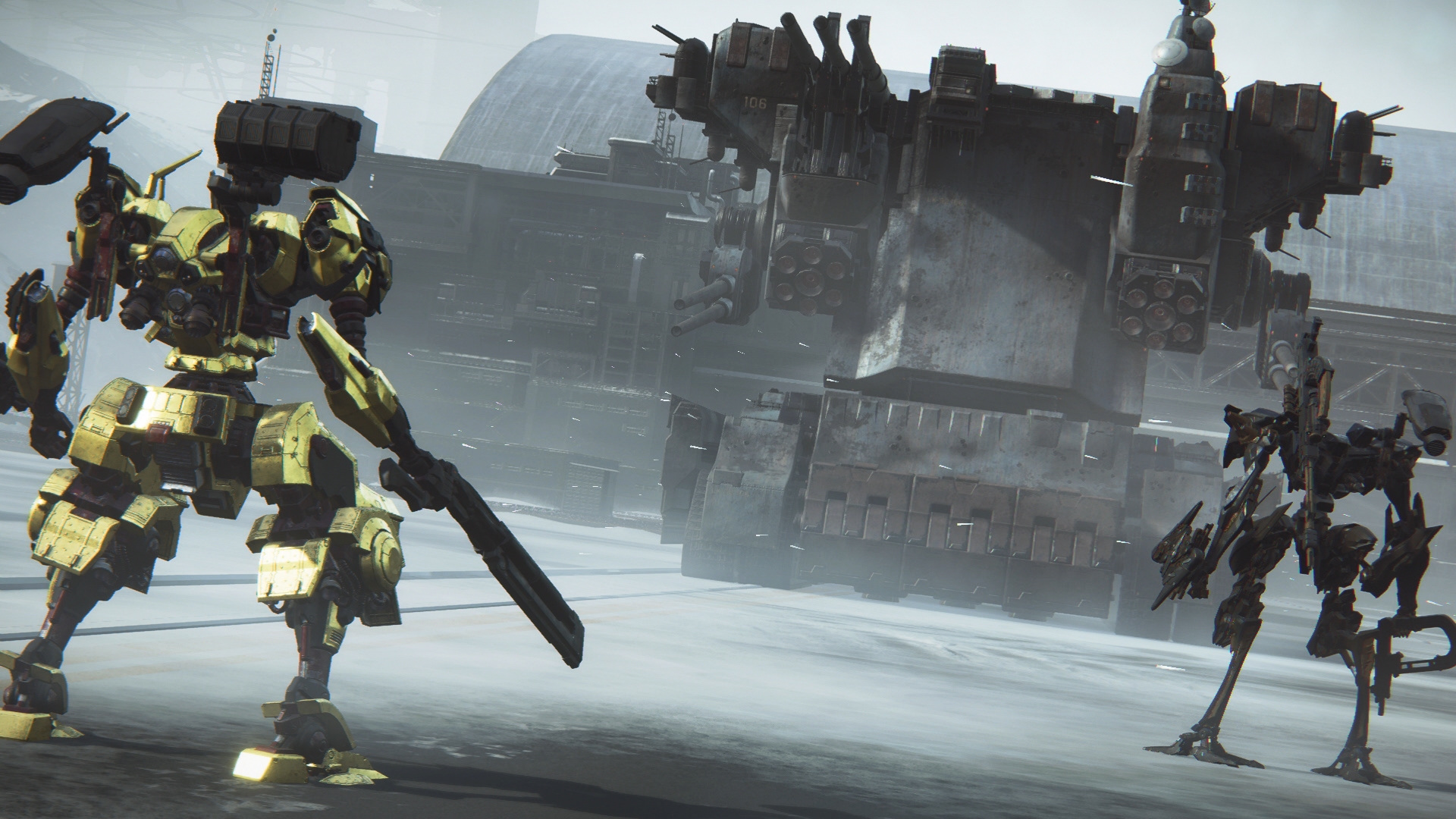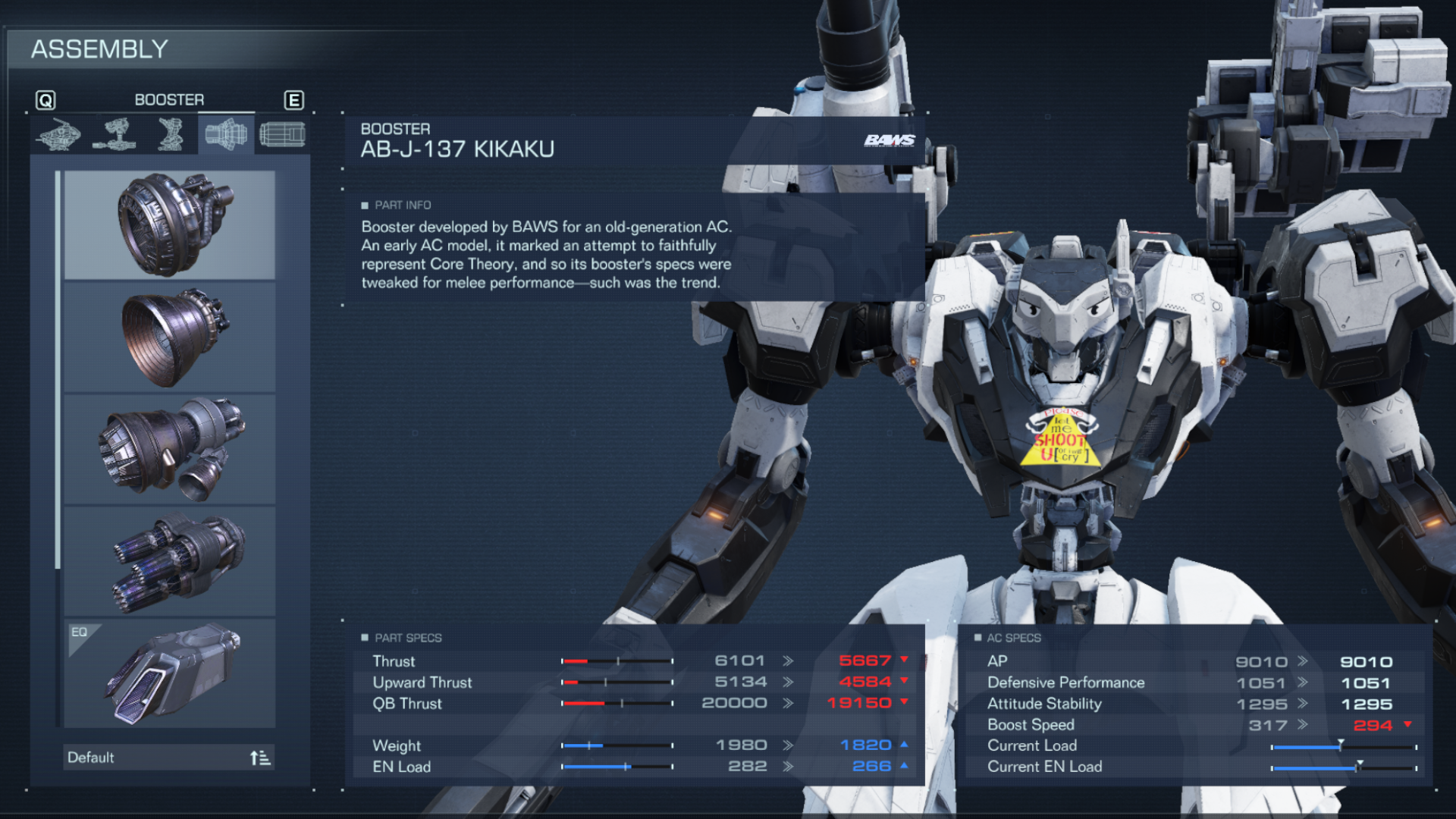Armored Core 6 doesn't need me to be a big stats guy to play with its toys, so I finally get to love a mech game
Learn by doing.

I've always watched mecha games from a safe distance, and with no small amount of envy. I like science fantasy, I like big robots, I like explosions. You'd think that me and the mecha genre would get along like fire and gunpowder. But there's always been one thing keeping me away: I'm not really a big stats guy.
Sure, if I'm already invested in something, I'll get down to the nitty gritty of its min-maxing culture. I love cobbling together builds for Dungeons & Dragons 5th edition (and, by extension, Baldur's Gate 3)—and I can handle ARPGs decently fine too, though I've got my upper limits. If I'm new to a genre, though, an unassailable wall of stats will shut me down.
Unfortunately for me, those kinds of stats sheets are a draw for many mecha fans. It comes with the territory—the satisfaction of balancing huge, mechanised warriors with financial implications and the fantasy engineering of it all, tickling the same feelings you might get planning out a new PC build's specs. I'm not going to dunk on that, either—numbers can be really compelling.
The older Armored Core games (from what I've learned) are a great example of this numbers game creating tension and drama. Losing a mission would see a sizable deduction from your pay, and it was possible to get into debt if you messed up enough. You had to be pretty sure you were bringing the right rig for the job—which meant paying attention to those stat walls in advance.
The problem is, I learn by doing. If I'm playing something like Elden Ring, for example, watching a video of a boss won't improve my chances—personally dying twenty times to them will. Same with Savage raiding in Final Fantasy 14—I can watch all the guides I like, but nothing will actually click until my ninja's boots are on the ground.
Armored Core 6 fixes this in several ways. Firstly, losing a mission just means you have to try again—you won't pay the usual repair costs for failed runs, so you're not punished for messing up. You go in, you see if your build works, you explode, you bring something new, you try again. From Software has also done a great job of writing detailed, understandable item descriptions for the game's parts—for example, if a booster's better at melee builds, the description will tell you that.

Like its predecessors, Armored Core 6 still needs you to bring the right tool for the job. Build well, and you'll flatten its challenges, build poorly, and you'll be flattened. But these changes open up the door for people like me, rewarding us for experimentation and weird, cursed builds rather than penalising us for our maverick streak.
Keep up to date with the most important stories and the best deals, as picked by the PC Gamer team.
That's not to say that Armored Core 6 doesn't have enough juicy stats to make min-maxers drool. And because of the easier road to understanding them, I've started to dabble myself—but I get to do that piecemeal, brushing up on my mechanomics in small doses between missions. Much of my knowledge about how one part compares to the other is obtained on the field.
Because of that, I finally get to be part of the mecha gaming world that I've been pining for from afar—Armored Core 6 has kept my attention long enough to steal my heart. Also, I get to create cursed bumper stickers and psychologically damaging paint jobs, which somehow make the explosions all-the-more satisfying.

Harvey's history with games started when he first begged his parents for a World of Warcraft subscription aged 12, though he's since been cursed with Final Fantasy 14-brain and a huge crush on G'raha Tia. He made his start as a freelancer, writing for websites like Techradar, The Escapist, Dicebreaker, The Gamer, Into the Spine—and of course, PC Gamer. He'll sink his teeth into anything that looks interesting, though he has a soft spot for RPGs, soulslikes, roguelikes, deckbuilders, MMOs, and weird indie titles. He also plays a shelf load of TTRPGs in his offline time. Don't ask him what his favourite system is, he has too many.

